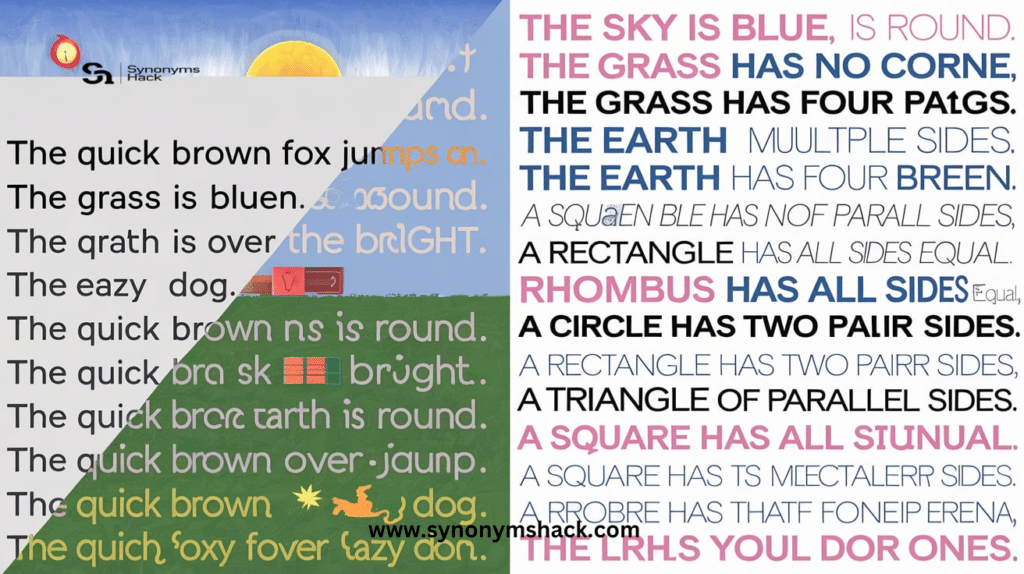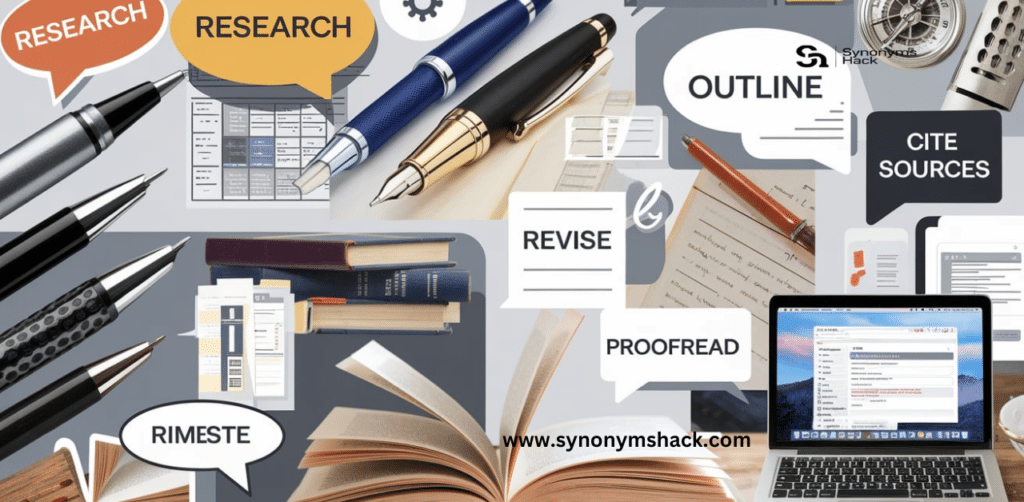Ever feel like you’re stuck in a rut, using the same old phrases over and over? We’ve all been there, especially when it comes to academic writing. One phrase that often gets overused is “the text states.” But fear not! I’m here to help you break free from this repetitive cycle and add some spice to your writing.
Let’s dive into twenty fresh alternatives that’ll make your academic discourse shine. These phrases will help you introduce quotes, present evidence, and discuss your sources with flair. Plus, I’ll throw in some real-world examples to show you how they work in practice.
Is It Professionally Good to Use “The Text States”?
Before we jump into the alternatives, let’s tackle the elephant in the room. Is it professionally acceptable to use “the text states” in formal writing? The short answer: yes, but with a caveat.
While “the text states” is a perfectly valid phrase in academic writing, relying on it too heavily can make your work sound repetitive and unimaginative. In the world of scholarly writing, variety is the spice of life. Using a range of phrases to introduce quotes and evidence shows that you have a strong command of language and can express ideas in multiple ways
So, while there’s nothing inherently wrong with “the text states,” your writing will benefit from mixing things up a bit. That’s where our alternatives come in handy!

Comprehensive List of Alternatives to “The Text States”
Now, let’s explore some creative ways to convey the same idea without falling back on this trusty old phrase.
- The passage claims
- The article articulates
- The writing specifies
- The section mentions
- The author asserts
- The document highlights
- The excerpt reveals
- The text indicates
- The passage demonstrates
- The source argues
- The passage suggests
- The literature emphasizes
- The document outlines
- The analysis proposes
- The report illustrates
- The findings indicate
- The narrative conveys
- The discourse presents
- The extract delineates
- The commentary posits
Read also: Other Ways To Say “For The First Time”
1. The Passage Claims
This alternative adds a subtle layer of interpretation, suggesting that the text is making an assertion rather than simply stating a fact.
Example: Email to a Professor
Subject: Analysis of Shakespeare’s Sonnet 18
Dear Professor Johnson,
In my research on Shakespeare’s Sonnet 18, I’ve come across an interesting interpretation. The passage claims that the comparison between the subject and a summer’s day is not just flattery, but a commentary on the lasting power of art. This perspective adds a new dimension to our understanding of the sonnet.
Best regards, Emily Chen
2. The Article Articulates
This phrase suggests a clear and expressive presentation of ideas in the source material.
Example: Book Review
Title: “The Hidden Language of Trees” – A Revolutionary Look at Forest Ecosystems
In her groundbreaking work, Dr. Suzanne Simard challenges our perception of forests. The article articulates a complex network of communication between trees, facilitated by fungal networks beneath the soil. This revelation forces us to reconsider our understanding of plant intelligence and ecosystem dynamics.
3. The Writing Specifies
Use this when the text provides detailed or precise information.
Example: Legal Document Analysis
Memo: Review of Contract Clause 7.3
Colleagues,
I’ve reviewed the disputed clause in our client’s contract. The writing specifies that all intellectual property created during the project timeline becomes joint property of both parties. This detail is crucial for our upcoming negotiations.
Regards, Mark Daniels, Legal Counsel
You must read: Other Ways To Say “Keep Up The Good Work”
4. The Section Mentions
This is useful when referring to a specific part of a longer text.
Example: Research Paper Citation
In discussing the effects of climate change on marine ecosystems, the section mentions a significant decrease in coral reef biodiversity over the past decade. This finding underscores the urgency of our conservation efforts.
5. The Author Asserts

This phrase implies a strong statement or argument made by the writer.
Example: Literary Criticism
In her analysis of “To Kill a Mockingbird,” Professor Maria Garcia offers a fresh perspective. The author asserts that Atticus Finch’s character, while admirable, represents a passive approach to combating racism that ultimately maintains the status quo.
6. The Document Highlights
Use this when the text emphasizes or draws attention to particular points.
Example: Company Report Analysis
To: Executive Team Subject: Q3 Financial Report Key Takeaways
Team,
I’ve reviewed our Q3 financial report, and there are some crucial points to note. The document highlights a 15% increase in revenue from our new product line, suggesting our recent marketing efforts have been successful.
Best, Sarah Lee, CFO
7. The Excerpt Reveals
This phrase is perfect for introducing surprising or important information from a text.
Example: Historical Document Analysis
In our examination of the recently declassified government files, we’ve made a startling discovery. The excerpt reveals that top officials were aware of the environmental risks associated with nuclear testing as early as 1954, decades before this information became public.
Don’t miss it: Other Ways To Say “Unfortunately In A Formal Email”
8. The Text Indicates
This alternative suggests that the information is being inferred or deduced from the text.
Example: Scientific Paper Discussion
In the latest study on exoplanets, researchers have made an exciting breakthrough. The text indicates that the presence of certain atmospheric gases could be a reliable biomarker for detecting life on distant planets.
9. The Passage Demonstrates
Use this when the text provides clear evidence or examples to support a point.
Example: Art History Essay
Caravaggio’s use of chiaroscuro revolutionized Baroque painting. The passage demonstrates how his dramatic contrasts between light and dark not only created visual impact but also conveyed deep psychological and spiritual themes.
10. The Source Argues

This phrase is useful when presenting a text’s main argument or thesis.
Example: Political Science Paper
In her seminal work on democratic transitions, Dr. Amina Khoury presents a controversial view. The source argues that economic development does not necessarily lead to democratization, challenging long-held assumptions in the field of political science.
Certainly! Let’s continue with 10 more ways to say “the text states,” building on our previous list and incorporating the requested keywords and LSI keywords.
11. The Passage Suggests
This phrase is useful when the text implies something without stating it directly.
Example: Literary Analysis Essay
In analyzing Virginia Woolf’s “Mrs. Dalloway,” the passage suggests that the character’s internal monologue reflects broader societal issues of the post-war era. This subtle commentary adds depth to Woolf’s narrative technique.
12. The Literature Emphasizes
Use this when referring to a body of work or multiple sources that stress a particular point.
Example: Research Proposal
In the field of cognitive psychology, the literature emphasizes the crucial role of sleep in memory consolidation. This consensus has significant implications for our study on learning efficiency.
13. The Document Outlines
This alternative is great for describing texts that provide a structured overview or plan.
Example: Business Strategy Memo
To: Marketing Team Subject: Q4 Campaign Strategy
Team,
I’ve reviewed the proposal for our Q4 marketing push. The document outlines a multi-channel approach, leveraging social media, influencer partnerships, and targeted email campaigns to maximize our reach.
Best, Alex Rodriguez, Marketing Director
You should read: Other Ways To Say “Happy Sunday”
14. The Analysis Proposes
Use this when presenting a text’s hypothesis or suggestion for action.
Example: Environmental Policy Paper
In addressing the issue of urban air pollution, the analysis proposes a combination of increased public transportation investment and stricter emissions standards for vehicles. This multi-faceted approach aims to tackle the problem from multiple angles.
15. The Report Illustrates
This phrase is useful when the text provides examples or data to support its points.
Example: Economic Forecast Presentation
In our latest quarterly forecast, we’ve identified some interesting trends. The report illustrates the growing impact of e-commerce on traditional retail sectors through a series of compelling charts and case studies.
Elevating Your Academic Discourse
Academic writing often demands a level of sophistication and variety that goes beyond everyday language. While phrases like “the text states” have their place, relying too heavily on them can make your writing feel repetitive and uninspired. Fortunately, there’s a wealth of alternatives at your disposal.
16. The Findings Indicate
Use this when discussing the results or conclusions of a study or investigation.
Example: Scientific Research Summary
Our team’s recent study on coral reef resilience has yielded surprising results. The findings indicate that certain species of coral are adapting to warmer ocean temperatures more quickly than previously thought, offering a glimmer of hope for reef conservation efforts.
17. The Narrative Conveys
This alternative works well when discussing the overall message or feeling of a piece of writing, especially in formal writing or educational writing.

Example: Film Review Essay
In his latest novel, Kazuo Ishiguro masterfully explores themes of memory and identity. The narrative conveys a sense of melancholy and longing through its protagonist’s fragmented recollections, mirroring the human experience of grappling with the past.
Also Read: Other Ways To Say “Great Asset To The Team”
18. The Discourse Presents
This phrase is particularly suitable for academic discourse or when referring to ongoing discussions in a field.
Example: Sociology Seminar Presentation
In contemporary gender studies, the discourse presents a more nuanced understanding of identity, moving beyond binary categorizations to recognize a spectrum of gender expressions and experiences.
19. The Extract Delineates
Use this when the text clearly defines or sets boundaries around a concept.
Example: Legal Brief
In examining the scope of intellectual property rights, the extract delineates the differences between copyright, trademark, and patent protections. This distinction is crucial for our client’s case involving software design.
20. The Commentary Posits

This alternative is ideal for introducing a text’s main argument or hypothesis, especially in scholarly writing.
Example: Philosophy Essay
In his seminal work “Being and Time,” Heidegger challenges traditional metaphysics. The commentary posits that our understanding of existence is fundamentally shaped by our experience of time, revolutionizing philosophical thought on ontology.

Final Words: Mastering the Art of Academic Expression
Congratulations! You’ve now expanded your repertoire with 20 powerful alternatives to “the text states.” These phrases will undoubtedly elevate your academic writing and help you express ideas with greater precision and elegance.
As you continue to develop your skills in writing in academia, don’t be afraid to experiment with different expressions. The more comfortable you become with varied language, the more nuanced and compelling your academic discourse will become.
For more tips on improving your academic writing, check out the Purdue Online Writing Lab’s guide to academic writing. This resource offers valuable insights into the conventions and expectations of scholarly communication.
Remember, mastering academic expression is a journey, not a destination. Keep practicing, stay curious, and don’t hesitate to seek feedback from peers and mentors. With time and effort, you’ll find your unique voice in the world of academic writing, making your arguments more persuasive and your ideas more impactful.

Brad Hook is the insightful admin and writer who brings depth and clarity to the world of synonyms. With a talent for making words accessible and engaging, he inspires readers to expand their vocabulary and explore language’s nuances. Brad’s writing helps others communicate more effectively and creatively every day.








